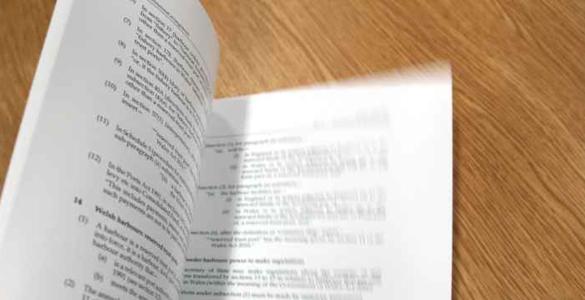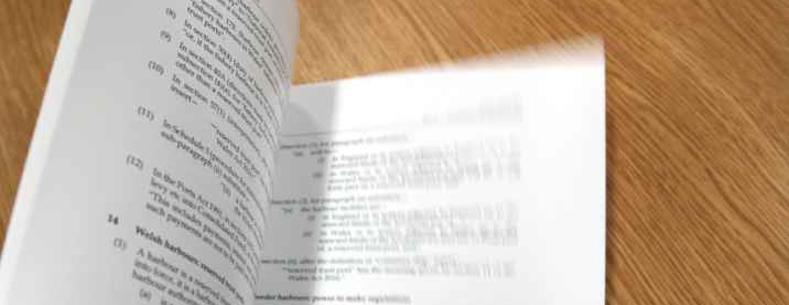Subordinate legislation governs much of our day-to-day lives. Errors can lead to ineffective or inconsistent laws, with real-world consequences for businesses and citizens.
In its Annual Report 2022/23, published in November 2023, the Legislation, Justice and Constitution Committee (‘the Committee’) expressed concern at the “high volume of errors occurring in Welsh Government subordinate legislation”, as well as the timeliness and process of making corrections.
This article considers the prevalence, scrutiny and correction of errors in the Welsh Government’s subordinate legislation.
What is subordinate legislation?
Primary legislation (Acts of the Senedd or UK Parliament) often give powers to the Welsh Ministers to make subordinate legislation. This can include regulations or orders. Generally, the finer detail of how laws operate is left to subordinate legislation.
For example, during the COVID-19 Pandemic, the Welsh Ministers exercised various powers under the Public Health (Control of Disease) Act 1984 to make regulations. These regulations had significant impacts on people’s lives, such as introducing requirements to isolate where a person tested positive for coronavirus.
More recently, the Environment (Air Quality and Soundscapes) (Wales) Act 2024 gives Welsh Ministers powers to set “long-term targets in respect of any matter relating to air quality in Wales”. The details about those targets, the levels and the timescales over which they will need to be achieved, will only be set out in regulations.
What is the role of the Senedd?
Different types of subordinate legislation can be made and the Senedd’s role differs depending on the type of subordinate legislation it is. You can find out more about the types and the Senedd’s role on the Senedd’s legislation pages.
A special role is given to the Legislation, Justice and Constitution Committee. It is responsible for scrutinising and reporting on each piece of subordinate legislation, as set out in Standing Orders (the rules about how business in the Senedd is run). The Committee issues reports on each piece and can raise both technical and merits points. These are explained below.
Standing Order 21.2 requires the Committee to report on matters that might affect the legality of legislation, known as technical reporting points.
For example, these could relate to inconsistencies in the English and Welsh language texts of legislation.
Standing Order 21.3 allows the Committee to report on other issues that might be of interest to the Senedd, such as whether the legislation achieves its policy aims, known as merits reporting points.
For example, these could relate to points about the level of consultation undertaken by the Welsh Government on regulations.
What issues have there been?
The Committee’s recent scrutiny has raised recurring issues with errors in subordinate legislation made by the Welsh Government. These include inconsistencies within texts, unclear definitions, incorrect references and typographical errors. The examples below provide an illustration of some of the errors raised and the potential issues that could be caused by these errors if left uncorrected.
In June 2023, the Welsh Government laid updated regulations relating to the collection of data on packaging supplied by producers. This followed the withdrawal of two draft regulations, which would have contained 31 technical reporting points,
One technical reporting point in the Committee’s report on the regulations noted that the word “data” was missing from the Welsh translation of the phrase “data collection period”. This meant that the law in Welsh was different to the law in English.
The Welsh Government confirmed in July 2023 that three errors, including the one referenced, had been corrected.
In November 2022, the Welsh Government laid draft regulations relating to the import of live animals and animal products.
The Committee’s report identified 27 technical reporting points, 5 of which related to defective drafting. Ahead of a plenary debate on the regulations, the Committee expressed concern about the errors. The Chair, Huw Irranca-Davies MS, wrote to the relevant Ministers, stating that the regulations could “reduce the effectiveness, operability and accessibility of the law”.
For example, one technical reporting point noted that the regulations make reference to “the appropriate authority”, but do not include a definition for this term. This could make it difficult for a reader to understand on who these responsibilities had been placed, and potentially leave the exercise of powers open to legal challenge.
The Minister for Rural Affairs and North Wales, Lesley Griffiths MS, said the errors identified by the Committee “do not have a substantial impact upon the operation of the regulations”, and asked the Senedd to approve the regulations. She noted that the powers within them to enable new administrative and legislative powers for Welsh Ministers would be lost otherwise, due to an enabling power in the European Union (Withdrawal) Act 2018 which was due to be switched off on 31 December 2022.
The Chair expressed concern at the expedited scrutiny process, and concluded that “the Senedd is being asked to pass a defective instrument, and from my committee's standing, that is strange”.
The Welsh Government committed to introduce in January 2023 amending legislation to rectify two points identified, as well as to addressing more minor scrutiny points “on making and publication”.
The Senedd subsequently voted to approve the regulations.
At time of writing, it is unclear whether required corrections have been made or are still necessary.
In January 2024, the Welsh Government made the order, which amended pension and compensation eligibility for firefighters.
One technical reporting point highlighted that, in paragraph 6(3) of Schedule 1, the English and Welsh texts had opposite meanings, and therefore contradicted each other. While it is law in Wales that the Welsh and English language texts of legislation have equal status, such an error could lead to a reader of the Welsh text having to turn to the English text for clarification.
The Welsh Government initially stated that the Welsh text would be “amended accordingly at the next available opportunity”. In February, it said an amending instrument would be introduced within “the next 8 to 10 weeks”.
How is subordinate legislation corrected?
|
Usually, subordinate legislation is corrected in two ways. Introducing new legislation: A government can withdraw defective draft legislation and introduce a new draft in its place. Once legislation has been passed, the government may introduce amending legislation to correct errors. Correction slip: Slips are generally used to correct typographical errors, rather than factual inaccuracies. They accompany the relevant online, PDF and printed legislation. |
In February 2024, the Counsel General said correction slips would be used for “minor, technical, inconsequential” errors, and that amending legislation would be used where there is a “more significant defect”. However, the Chair of the Committee noted in January an example of a Minister seeking to use correction slips for more substantive corrections.
After a correction is made
The Chair of the Committee recently expressed concern over the clarity and transparency of information coming back to the Senedd after corrections are made, as well as over the time taken to make corrections.
In March 2024, the Counsel General said, moving forward, the Welsh Government will provide a table setting out corrections to be made “prior to making draft affirmative instruments”. He also said the Welsh Government will inform the Senedd of corrections during relevant debates.
The tracking and reporting of errors in subordinate legislation remains high on the Committee’s agenda.
Article by Adam Cooke, Senedd Research, Welsh Parliament






